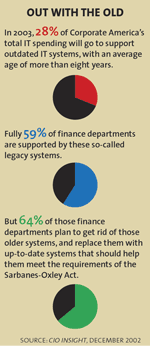In July, one of the biggest corporate reform packages since the Great Depression was passed by Congress and signed into law by President Bush. The new rules, which will force companies to cough up more timely, accurate and detailed accountings of their financial health and make CEOs and CFOs certify under oath the accuracy of their corporations’ filing, are proving time-consuming and cumbersome to many corporate executives who have never before had a problem with their financial filings.
Compliance will mean that companies of all sizes may need to overhaul or upgrade their financial reporting networks and software in the coming months and years to meet the SEC’s new demands for more accurate, detailed and speedier filings.
“This really shines a spotlight on the inadequacy of a lot of legacy systems out there,” says Brian Kinman, a partner in strategic risk services at PricewaterhouseCoopers. “Can companies meet these new requirements with existing systems? Maybe. But these new reporting requirements tighten up the deadlines significantly, and now there’s zero tolerance for error.”
CIO Insight research shows that 59% of finance departments among U.S. corporations still supported by legacy systems. The upshot: Corporate America has a considerable ways to go to meet the SEC’s new deadlines, which helps explain why fully 64% of companies expect to do away with outdated financial systems in the next couple of years.
Related stories:
For more information on the Sarbanes-Oxley Act, visit:
